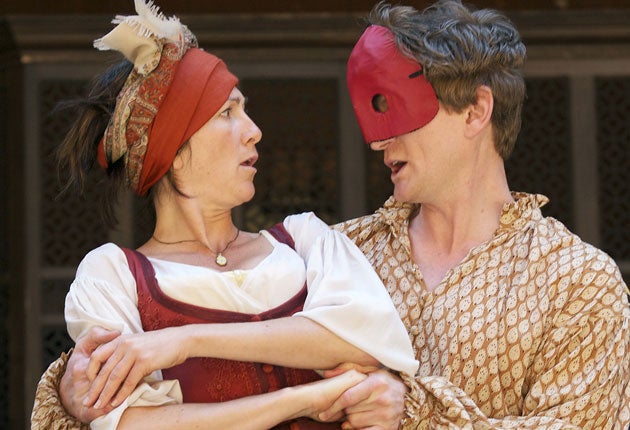Much Ado About Nothing, Shakespeare's Globe, London
Much to love in this witty production

Your support helps us to tell the story
From reproductive rights to climate change to Big Tech, The Independent is on the ground when the story is developing. Whether it's investigating the financials of Elon Musk's pro-Trump PAC or producing our latest documentary, 'The A Word', which shines a light on the American women fighting for reproductive rights, we know how important it is to parse out the facts from the messaging.
At such a critical moment in US history, we need reporters on the ground. Your donation allows us to keep sending journalists to speak to both sides of the story.
The Independent is trusted by Americans across the entire political spectrum. And unlike many other quality news outlets, we choose not to lock Americans out of our reporting and analysis with paywalls. We believe quality journalism should be available to everyone, paid for by those who can afford it.
Your support makes all the difference."Comparisons are odorous," declares Dogberry, the verbally challenged constable in Much Ado about Nothing.
Comparisons – one hopes, not invidious – are also pretty inevitable at the moment, given that two high- profile productions of this great Shakespearean comedy are opening within a week of each other.
Receiving its premiere on Wednesday is the David Tennant/ Catherine Tate version for Josie Rourke at Wyndham's. First off, though, we have this glorious Globe staging. It's directed by Jeremy Herrin and stars the sublime Eve Best and that great, underrated comic/ romantic actor Charles Edwards as those bickering, ostensibly reluctant lovers, Beatrice and Benedick. It's a witty, warm-hearted and emotionally eloquent account of the play that makes the most of the Globe's matchless capacity for a buoyant rapport with the audience. It will be a double bounty if Rourke's production works as well within its own (indoor, proscenium arch) terms of reference.
"Thou and I are too wise to woo peaceably," Benedick tells Beatrice. It's possible for a production to make this couple unconventional to the point of crankiness, but there's nothing too eccentrically misfit about Best and Edwards. They are both very good-looking and sexually attractive and you feel the romantic current pulsing between them as they struggle to fend off the recognition that they are sparring partners because they are soul mates. In her role as resident cynical comedienne to her family, this Beatrice's radiant, impish, audience-embracing manner indicates how unsoured she is by her lot. There's a life-affirming energy even to her negations, as when she calls Benedick in to supper by swinging a huge hand bell in his face.
It's clear from the text that this pair have had a bruising run-in in the past (his fault, I fear). The memory of this causes a momentary shadow to pass across the sunlit Best. That fact, plus the quality of the central performances, alerts one to the fact that Much Ado is first cousin to those great Hollywood comedies of re-marriage such as The Philadelphia Story and His Girl Friday. And listening to Edwards as he wrings every last comic nuance out of Shakespeare's intricate prose speeches (he plays Benedick as an affable, would-be suave smoothie who uneasily knows that the audience can see through his pose of confirmed bachelorhood), you realise that you are hearing in Much Ado the birth of Restoration comedy.
In rep to 1 October (020 7401 9919)
Join our commenting forum
Join thought-provoking conversations, follow other Independent readers and see their replies
Comments